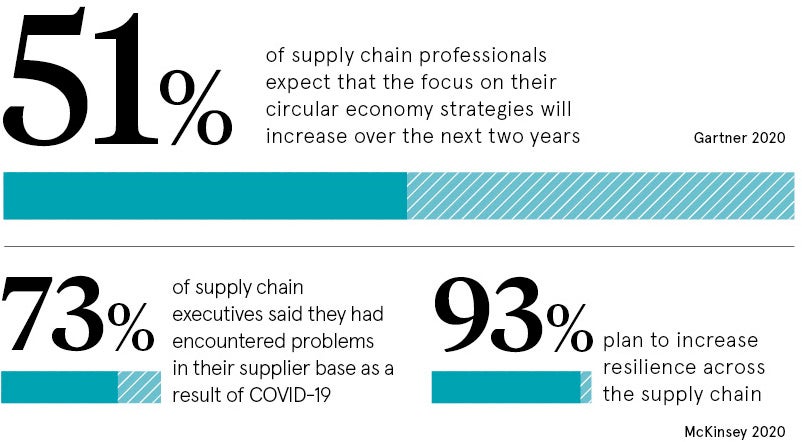
As the coronavirus calendar passes the six-month mark, ideas of what constitutes a sustainable supply chain in a post-pandemic world have changed, for the better. Gone are the early days of disruptive consumer desperation, panic buying toilet rolls and searching shop by shop for flour. Now, we can question what we really want from the big reset.
The all-too-real threat of climate risk means decarbonisation and net-zero targets remain on the table for any sustainable supply chain. So too do protestations around pollution, as images of ocean plastic found in washed-up marine mammals will not leave the public consciousness, or conscience, any time soon.
So, what has coronavirus actually done for supply chains? There are two different answers to that question: the practical one revolves around the spectacular spike in ecommerce and the more philosophical answer embraces the regenerative power of ecosystem-led resilience.
Either way, the sustainable supply chain of the future ought to be different, by design and by choice, says Kevin Quigley, commercial director of food-waste recyclers Warrens Group.
Business owners shouldn’t be in a hurry to get back to pre-COVID performance with quick-fix solutions. They need long-term sustainability goals,” he says. “This is a rare moment in our history when there is an opportunity to rebuild on a clean path of growth.”
Making sustainable supply chain a strategic priority
To act fast, but think long term, is a tough ask. Sustainability is therefore a strategic play, to be backed by investment and innovation, says Mike Landry, global supply chain service line leader at digital transformation experts Genpact.
“COVID-19 has forced supply chain leaders to focus on short-term priorities in 2020, implementing agile responses to global disruption. But now is not the time to pause sustainability efforts; longer-term, systemic threats will still be there once disruption eases, along with consumer pressure to solve them,” he says.
For many organisations, given a boom in ecommerce, delivering the sustainable supply chain has taken on a very literal meaning. Companies pioneering innovation in greener logistics include LivingPackets, that offers packaging that can be reused 1,000 times, with digital address displays to facilitate returns.
Also driving sustainable, digital change is the ORION platform, employed by UPS. ORION uses advanced algorithms, artificial intelligence (AI) and machine-learning to optimise deliveries and reduce carbon footprint, saving UPS about 100 million miles and 10 million gallons of fuel a year.
For traceability and transparency, from provenance to chain of custody, independent third-party validation also helps underpin brand credibility, mitigating risk, says Ruth Rennie, director of standards and assurance at the Rainforest Alliance.
“Sustainability standards and certification focus businesses on necessary actions and measurable requirements,” she says. “This key data on risks and performance, updated through regular verification, is critical for businesses to constantly adapt their strategies for building more resilient and sustainable supply chains.”
Digitisation of supply chain management
The influence of digitisation on the business of supply chain management began long before COVID-19, promising multiple sustainability gains. Initially, though, when the pandemic broke, fears surfaced that a reactive ecommerce surge might relegate environmental concerns down the list of priorities.
As supply lines and market confidence recover, however, so too will appreciation of the deeper green merits of digital, says Reid Fairbairn, business manager at DG International.
“Digitalisation of the supply chain means more oversight into how deliveries are being made, with supply chain managers able to make more informed choices based on sustainable credentials,” he says.

Visibility is an issue, though. A recent study of UK businesses by smart procurement advocates Ivalua found almost four out of ten firms identified poor data quality as the biggest barrier to mitigating environmental concerns in their supply chain.
Much as digital solutions might promise a double dividend for supply chains, enabling sustainable growth, while increasing efficiency and reducing waste, improved data on its own is insufficient, according to James MacGregor, environmental economist at Ramboll.
“There are questions about the value of data, plus the cost of collecting and analysing. We live with a mantra for accurate, up-to-date and dynamic data, to optimise efficiencies, understand pros and cons, but we are blinded to how this impacts or trickles down to true sustainability,” he says.
How to feed a nation during a pandemic
Food security, and by association food waste, became a key focus for supply chain performance, with fierce media attention and public concern, during national lockdown. Feeding a nation effectively under siege involves big numbers. Indeed, data scientists at digital supply chain platform Blue Yonder predicted the UK’s top eight grocers could cut £144 million a year in food waste by using AI and machine-learning in their supply chains.
Addressing the risk of a full-blown food crisis, therefore, opened up opportunities for digital to deliver, in every sense. Orderly, for example, worked with UK supermarket Morrisons to implement a direct-to-consumer offering in only six days.
Not surprisingly, then, a sustainable supply chain is essentially agile, says Orderly chief executive Peter Evans. However, he is also keen to point out there is more to sustainability than just efficiency and optimisation measures, such as streamlining journeys to cut air and road miles, or just-in-time local production to save on energy-hungry warehousing.
“The social contract between business and customers is changing,” he says. “Sustainability is no longer an afterthought, but a must. The pandemic has opened up the public’s eyes to how we must band together for the greater good and strive for connection.”
Supply chain efficiency is no longer enough
Ultimately, though, for resilience to be regenerative, where the environment and local ecosystem are enhanced, not harmed, the only true reset is circular, says Louise Kjellerup Roper, chief executive of London-based change agency Volans.
“Over past decades, the pursuit of efficiency has squeezed resilience out of supply chains. So, highly efficiency-driven global supply chains must be dismantled to ensure not only resilience, but also sustainability,” she concludes. “For a start, we need to stop thinking of them as supply chains and shift to a circular economy mindset.” This is the real big reset.

As the coronavirus calendar passes the six-month mark, ideas of what constitutes a sustainable supply chain in a post-pandemic world have changed, for the better. Gone are the early days of disruptive consumer desperation, panic buying toilet rolls and searching shop by shop for flour. Now, we can question what we really want from the big reset.
The all-too-real threat of climate risk means decarbonisation and net-zero targets remain on the table for any sustainable supply chain. So too do protestations around pollution, as images of ocean plastic found in washed-up marine mammals will not leave the public consciousness, or conscience, any time soon.
